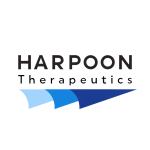Welcome to our dedicated page for Harpoon Therapeutics news (Ticker: HARP), a resource for investors and traders seeking the latest updates and insights on Harpoon Therapeutics stock.
Our selection of high-quality news articles is accompanied by an expert summary from Rhea-AI, detailing the impact and sentiment surrounding the news at the time of release, providing a deeper understanding of how each news could potentially affect Harpoon Therapeutics's stock performance. The page also features a concise end-of-day stock performance summary, highlighting the actual market reaction to each news event. The list of tags makes it easy to classify and navigate through different types of news, whether you're interested in earnings reports, stock offerings, stock splits, clinical trials, fda approvals, dividends or buybacks.
Designed with both novice traders and seasoned investors in mind, our page aims to simplify the complex world of stock market news. By combining real-time updates, Rhea-AI's analytical insights, and historical stock performance data, we provide a holistic view of Harpoon Therapeutics's position in the market.
Harpoon Therapeutics (Nasdaq: HARP) appointed Wendy Chang as Senior Vice President of Human Resources and Banmeet Anand, Ph.D., as Senior Vice President of Translational Medicine. Wendy Chang has over 20 years of experience, previously working at IDbyDNA and Gilead Sciences. Dr. Anand boasts 18 years in translational research, previously at Molecular Templates and Genentech. This leadership enhancement aims to bolster Harpoon's strategic direction and clinical advancements in T cell engagers, critical for treating cancer and other diseases.
Harpoon Therapeutics (HARP) released interim data on HPN328, a novel T cell engager targeting DLL3 for treating small cell lung cancer (SCLC) and other neuroendocrine cancers. The study indicated HPN328 was clinically active and exhibited a favorable safety profile, with Grade 1-2 cytokine release syndrome (CRS) in 22% of patients but no severe cases. Notably, 27% of SCLC patients showed significant tumor reduction. With one confirmed partial response and ongoing dose escalation, Harpoon aims to identify optimal dosing for expansion studies by year-end.
Harpoon Therapeutics (HARP) announced Q1 2022 financial results, reporting $5.9 million in revenue, down from $9.0 million in Q1 2021 due to decreased collaboration revenue. The company ended the quarter with $112.5 million in cash, sufficient to fund operations through mid-2023. R&D expenses rose to $20.8 million from $16.2 million in the prior year, reflecting clinical trial costs. Notably, net loss decreased to $20.3 million compared to $61.7 million in Q1 2021, which included a significant legal settlement.
Harpoon Therapeutics (Nasdaq: HARP) has announced a clinical supply agreement with Roche for atezolizumab (Tecentriq®). This collaboration will support the evaluation of HPN328, a DLL3-targeting T cell engager, in combination with atezolizumab for patients with small cell lung cancer. The ongoing Phase 1/2 trial aims to assess the safety, tolerability, and pharmacokinetics of HPN328 while addressing significant unmet medical needs in this patient population. Harpoon plans to initiate combination trials across multiple therapy lines.
Harpoon Therapeutics, a clinical-stage immunotherapy company, presented preclinical data on its TriTAC-XR T cell engager platform at the AACR Annual Meeting. The results show that TriTAC-XR can mitigate cytokine release syndrome (CRS) while maintaining therapeutic efficacy, potentially allowing for applications beyond oncology. The platform demonstrated the ability to release active drug over time, resulting in lower cytokine levels in animal models. TriTAC-XR could improve safety and expand treatment options for autoimmune and other non-cancer diseases.
Harpoon Therapeutics (HARP) announced the departure of Chief Medical Officer, Natalie Sacks, effective June 1, 2022, who will consult until year-end. The management expressed gratitude for her contributions to advancing multiple development programs. In the interim, Yifah Yaron and Mark Sayles will lead clinical activities while a search for her replacement is underway. The company is focused on its T cell engager platform targeting solid tumors and hematologic malignancies, with ongoing trials for HPN217 and HPN328.
Harpoon Therapeutics, a clinical-stage immunotherapy company, announced its participation in a fireside chat at the Canaccord Genuity Horizons in Oncology Virtual Conference on April 14, 2022, at 2:30 p.m. ET. The event will feature discussions on their innovative T cell engagers and ongoing clinical trials for treatments focusing on solid tumors and hematologic malignancies, including therapies for multiple myeloma and small cell lung cancer. A live audio webcast will be available on their website, with a replay accessible later.
Harpoon Therapeutics (HARP) reported financial results for Q4 and the full year 2021, highlighting a revenue decrease to $4.3 million from $7.5 million year-over-year, while annual revenue rose to $23.7 million from $17.4 million. The company has around $136.6 million in cash and liquid assets, down from $150 million in 2020. R&D spending increased to $20.7 million for Q4 and $72.1 million for the year. Harpoon announced the discontinuation of the HPN424 dose escalation study but has achieved significant clinical advancements with HPN328 and HPN217, receiving Orphan Drug and Fast Track designations respectively.
Harpoon Therapeutics (NASDAQ: HARP) received Orphan Drug Designation from the FDA for its candidate HPN328, targeting DLL3 for small cell lung cancer (SCLC). This designation facilitates clinical development, providing tax credits and potential marketing exclusivity upon approval. HPN328 is currently in a Phase 1/2 trial, assessing its safety and efficacy in patients with advanced cancers expressing DLL3. As of the last update, preliminary results show tolerability with some patients experiencing target lesion reduction.
Harpoon Therapeutics (HARP) has received FDA Fast Track designation for HPN217, targeting multiple myeloma patients who are relapsed and refractory after multiple therapies. The ongoing Phase 1/2 trial aims to identify a suitable initial dose for the expansion phase in 2022. The Fast Track designation underscores the pressing need for new treatments in this patient population. In 2019, Harpoon entered a licensing agreement with AbbVie, who may license HPN217 upon trial completion. This designation may facilitate faster development and review of HPN217, ultimately expediting its availability to patients.

